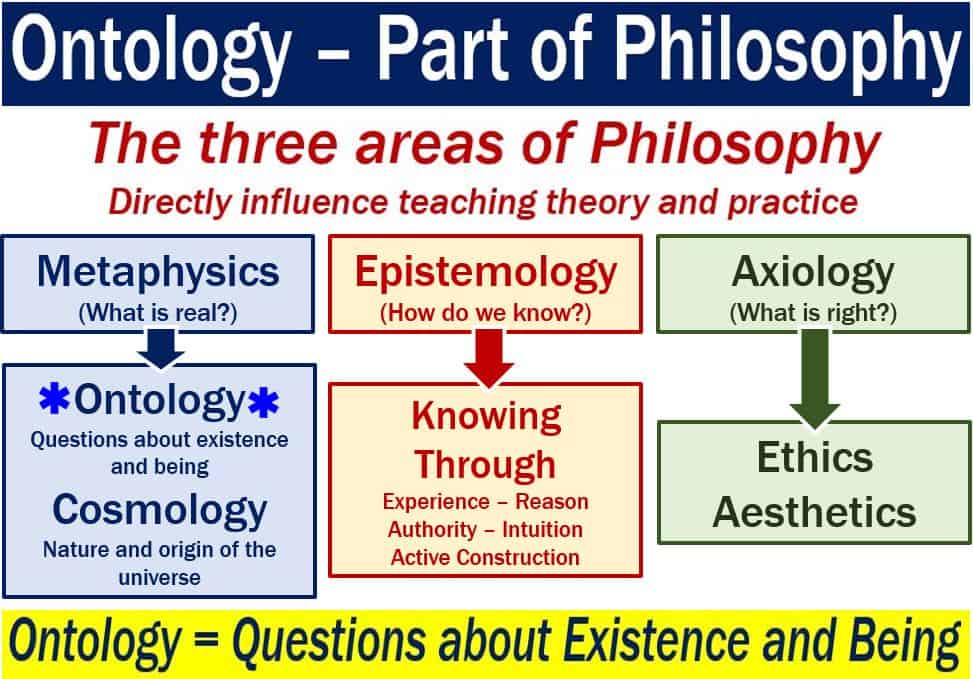Ontology – definition and meaning
Ontology is the study of things in the Universe. In other words, what kind of things exist? What entities are there in our Universe? Ontology is a branch of metaphysics that deals with the nature of being. Metaphysics is a branch of philosophy, not physics – it deals with the first principles of things.
The term sounds like oncology, which is the study and treatment of tumors (cancer). However, it has nothing to do with oncology.
The term also includes the basic categories of being and how they relate to each other.
In other words, ontology deals with questions concerning what exists or may exist, and how we group those entities. We group them ontologically, i.e., according to their similarities and differences.
Put simply; it is the examination of what we mean, in context, by the word ‘thing.’
The Online Etymology Dictionary says that the English term comes from Modern Latin ‘Ontologia’ (c. 1600). However, its roots go back to ancient Greece.
‘Ont’ in Ancient Greek means ‘to be.’ Etymology is the study of the history of words and how their meanings evolved.

Ontology – principal questions
The principal ontological questions are:
- ‘What exists?’ and ‘What can we say exists?’
- What is a thing?
- Can we sort existing things into categories? And if so, what categories?
- What does ‘being’ mean?
- What modes of being do entities have?
The Cambridge Dictionary has the following definition of ontology:
“The part of philosophy that studies what it means to exist.”
Ontology in computer science
The term is also used in computer science. In computer science, it refers to IT resources that represent previously-agreed domain semantics. ‘IT’ stands for Information Technology.
Webopedia.com has the following definition for the term in computer science:
“In relation to computer science, ontology refers to computer-based resources that represent agreed domain semantics.”
Ontology is in our nature
It is human nature to classify things. In fact, we like doing it. Throughout human history, we have been taking apart the Universe and creating an underlying structure for everything.
Humans love structure. We love structure because it allows us to pigeon-hole knowledge into compartments that we understand more easily. Hence, we have ontology.
Humans have discussed ontological concepts for a long time. In fact, we have been philosophizing over it for thousands of years.
Our first discussions on the ontological categorization of existence date back to Parmenides, circa 500 BCE. Parmenides was a pre-Socratic Greek philosopher.
In modern history, artificial intelligence (AI) research in the 1970s brought about the rebirth of ontological categorization.
Tom Gruber borrowed the term from philosophy as an apt system for categorizing and ordering knowledge systems. Specifically, knowledge systems that AI engineers required.
Tom Gruber is an American computer scientist, inventor, and entrepreneur. He created the Siri intelligent personal assistant, part of the operating systems of Apple Inc. devices.
You can find existing ontologies everywhere. In fact, there are thousands of them in the world today. They exist in virtually every industry, from medical research, e-commerce, to software engineering. Ontologies also exist in banking and linguistic processing.
Compound words and phrases
Here are some compound words and phrases with the word ‘Ontology’.
-
Ontology Development
The process of creating or constructing an ontology, often involving the identification and organization of concepts and relationships within a specific domain.
-
Ontology Engineering
The systematic design and implementation of ontologies, involving the development of ontological structures and the use of various methodologies and tools.
-
Ontology Mapping
The process of establishing correspondences or connections between different ontologies, enabling data integration and interoperability between disparate systems.
-
Ontology Integration
The incorporation of multiple ontologies or ontological elements into a unified and coherent framework, facilitating the seamless exchange of information across diverse platforms or applications.
-
Ontology Modeling
The construction of a formal representation or conceptual model that defines the entities, attributes, and relationships within a particular domain of interest.
-
Ontology-based
Referring to systems, methodologies, or approaches that rely on the use of ontologies to organize, classify, and manage information within a specific context or domain.
-
Ontology Alignment
The process of harmonizing or matching different ontologies to ensure consistency and compatibility between various conceptual schemas or knowledge representations.
-
Ontology Design
The systematic planning and creation of an ontology, involving the identification of key concepts, properties, and relationships that define a particular domain or knowledge area.
-
Ontology Framework
A structured and organized approach or structure that provides a foundation for creating, managing, and utilizing ontologies within specific applications or knowledge domains.
-
Ontology Management
The oversight and administration of ontologies, including tasks such as maintenance, updating, and version control to ensure the accuracy and relevance of ontological data.
-
Ontology Representation
The depiction or portrayal of knowledge, concepts, and relationships within a specific domain using formal languages or graphical models to enable effective information processing and retrieval.
-
Ontology Query
The process of retrieving or extracting specific information or data from an ontology, often involving the use of query languages or search techniques to access relevant knowledge within a knowledge base.
-
Ontology Language
A formalized language or set of symbols and rules used to define and express ontological concepts, relationships, and axioms within a specific knowledge domain or application.
-
Ontology Repository
A centralized storage or database system that houses and manages ontologies, allowing for the storage, retrieval, and sharing of ontological data and resources within a specific community or organization.
-
Ontology Application
The practical implementation or utilization of ontological principles and structures within various software applications, systems, or knowledge management tools to enable effective data organization and retrieval.
Video – What is Ontology?
This video comes from our sister YouTube channel – Marketing Business Network.

